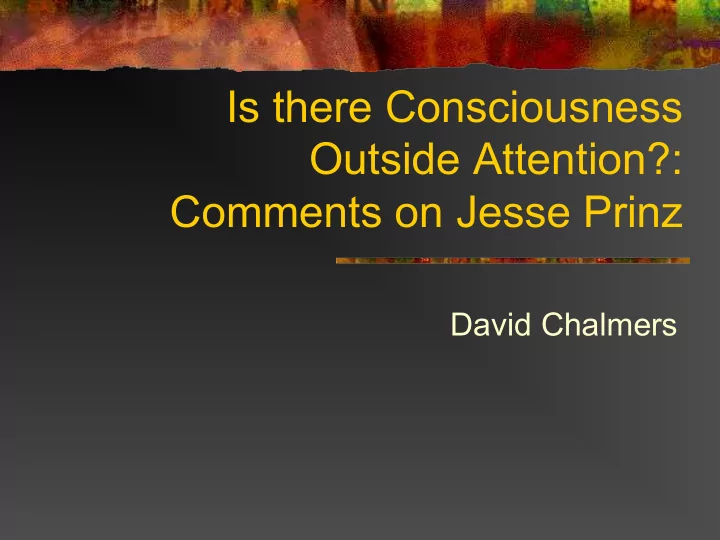

Is there Consciousness Outside Attention?: Comments on Jesse Prinz David Chalmers
Disputes about the Richness of Phenomenology Is there a nonsensory phenomenology of thinking? Is there high-level phenomenology of perception? Is there ubiquitous experience of oneself? Is there consciousness outside attention?
Consciousness Outside Attention n Thin View: There is no consciousness outside attention n One experiences X only if one attends to X. n Thick View: There is consciousness outside attention n One can experience X without attending to X.
The Basic Worry n The dispute between thin and thick views here is especially difficult, as prima facie it ’ s not easy to see how first-person or third-person data can settle it. n Primary first-person data come via introspection, but introspection proceeds via attention. n Primary third-person data come via verbal report, but verbal report proceeds via attention. n These yield data about consciousness within attention, but are silent about consciousness outside attention?
Synchronic and Retrospective Data n If verbal report or introspection are of a current experience, they are ipso facto of an attended experience n So cannot reveal consciousness outside attention n If report or introspection are of a past experience, then they are ipso facto of a remembered experience n But experiential memory is certainly incomplete n Unattended experience may well be unremembered.
Bridging Principles n The move from third-person data to conclusions about consciousness requires bridging principles. n Worry: Any bridging principle strong enough to settle the issue will be at least as contestable as the thin and thick views themselves.
Jesse ’ s Case for the Thick View n Jesse ’ s case for the thin view is grounded in: n (1) Neglect phenomena n (2) Inattentional blindness phenomena n (3) A theoretical framework for explaining the conscious/unconscious distinction n I ’ ll consider each.
Neglect Phenomena n In neglect, there is a deficit of attention and an ensuing absence of consciousness. n But: (i) It ’ s not really clear that consciousness is absent in neglect cases n (ii) it ’ s not clear that a deficit of attention is all that ’ s going on in these cases (e.g., maybe there ’ s a more broader deficit of accessibility)
Inattentional Blindness n In inattentional “ blindness ” : a stimulus presented outside attention is unnoticed by the subject. n (1) The subject doesn ’ t experience the stimulus n (2) The absence of experience is best explained by the absence of attention --------- n (3) There is no consciousness outside attention.
Inattentional Amnesia n The “ inattentional amnesia ” hypothesis denies (1): The subject experiences the unattended stimulus, but (perhaps because it is unattended), it is unnoticed and unremembered. n Q: How can we choose between IB and IA? n Jesse gives five reasons for preferring IB to IA.
1. Negative Report n Jesse: Why does the subject report not seeing the stimulus? n IA: Because they didn ’ t attend to the stimulus, and attention is the gateway to report (and perhaps to memory).
2. The Authority of Reports n Jesse: We should take reports at face value, in absence of reasons to doubt them. The science of consciousness requires this n IA: Synchronic reports (especially synchronic positive reports) may have this sort of authority, and these are central to the science. But given the gap between experience and memory, retrospective reports (especially retrospective negative reports) do not.
3. Panphenomenalism n Jesse: Rejecting verbal reports may lead to panphenomenalism. n IA: We can still appeal to synchronic reports.
4. Apparent Motion n Jesse: The stimulus doesn ’ t give rise to apparent motion, so is not experienced. n IA: Why think that apparent motion is criterial for experience? Prima facie, apparent motion turns on some sort of binding. And we know that absence of attention often yields absence of binding. So absence of apparent motion may just reveal absence of attention.
5. Functional Differences n Jesse: There are numerous functional/ behavioral differences (forced choice, priming etc) between the unattended stimulus and typical experienced stimulus. n IA: These differences arise from the presence and absence of attention, not from the presence and absence of experience.
Inattentional Inattention n My view: Both “ inattentional blindness ” and “ inattentional amnesia ” are tendentious characterization. A more neutral chacterization might be: n Inattentional inattention: An unattended stimulus (surprisingly) fails to capture attention. n I.e. the phenomena is most clearly a failure not of experience, nor of memory, but of attention capture.
From Inattentional Inattention to Inattentional Blindness? n Q: How can one infer the absence of experience from the absence of attention capture? n 1. By assuming that experience requires attention? But then the reasoning presupposes the thick view and cannot support it. n 2. By assuming that where there is experience, it will capture attention? But on any plausible version of the thick view this will be false. n 3. By assuming that sufficiently salient/surprising experienced stimuli will capture attention? Perhaps the lesson of “ inattentional blindness ” is that this is false.
Theoretical Support n Jesse supports the link between conscious and attention with a theoretical framework, on which consciousnes requires accessibility to working memory, as does attention. n But there are alternative theoretical frameworks, allowing more distinctions.
Alternative Framework n 1. Consciousness requires accessibility, whereas attention requires access. n 2. Consciousness serves as grounds for attention: when one is conscious of X, this allows one to attend to X.
Advantages n The alternative framework arguably fits better with our pretheoretical view of consciousness and attention n (I) attention as searchlight within a field of consciousness n (ii) a less fragmented and discontinuous phenomenal field n (iii) conscious contents typically available for attention, unconscious contents not
Conclusions n Experimental and phenomenological data appear broadly compatible with both thick and thin views n Choosing between these may turn on which best comports with a satisfactory account of the cognitive, epistemological, and semantic role of consciousness.
Recommend
More recommend